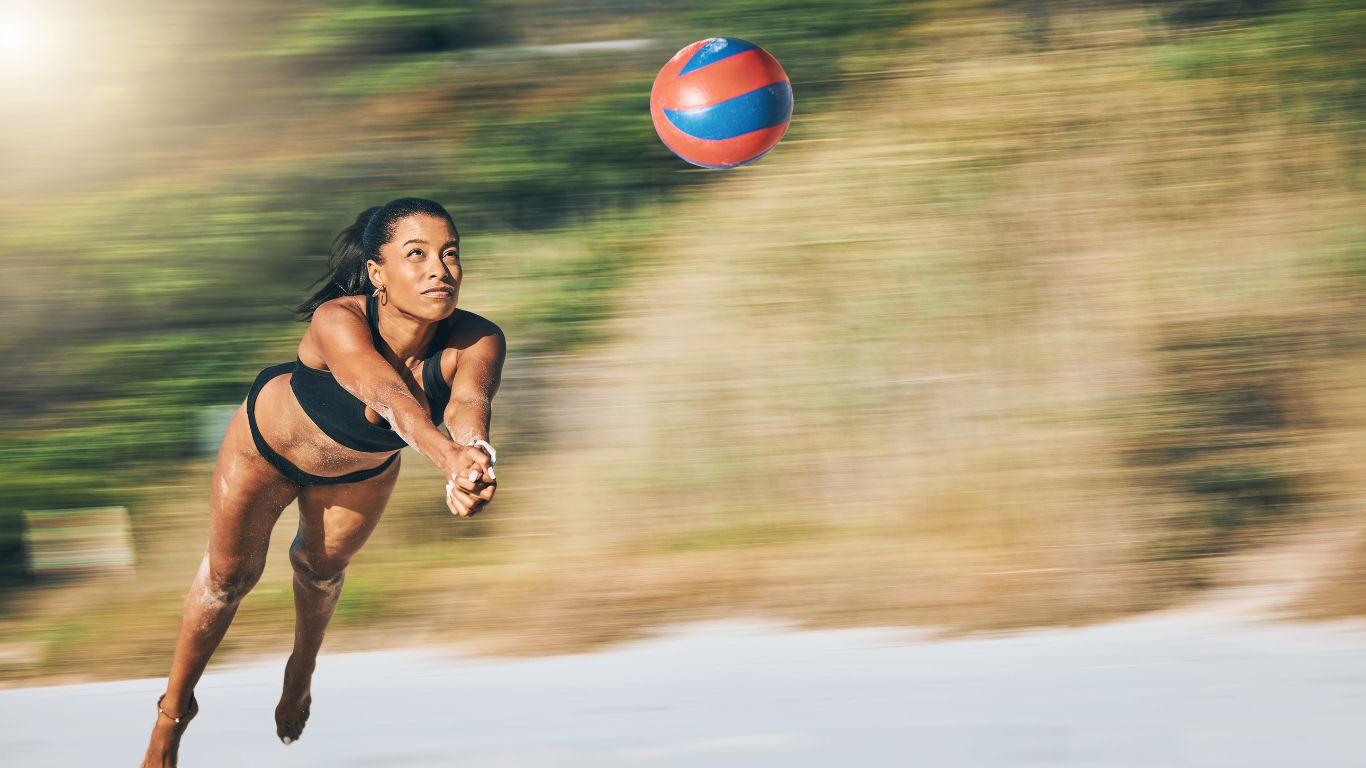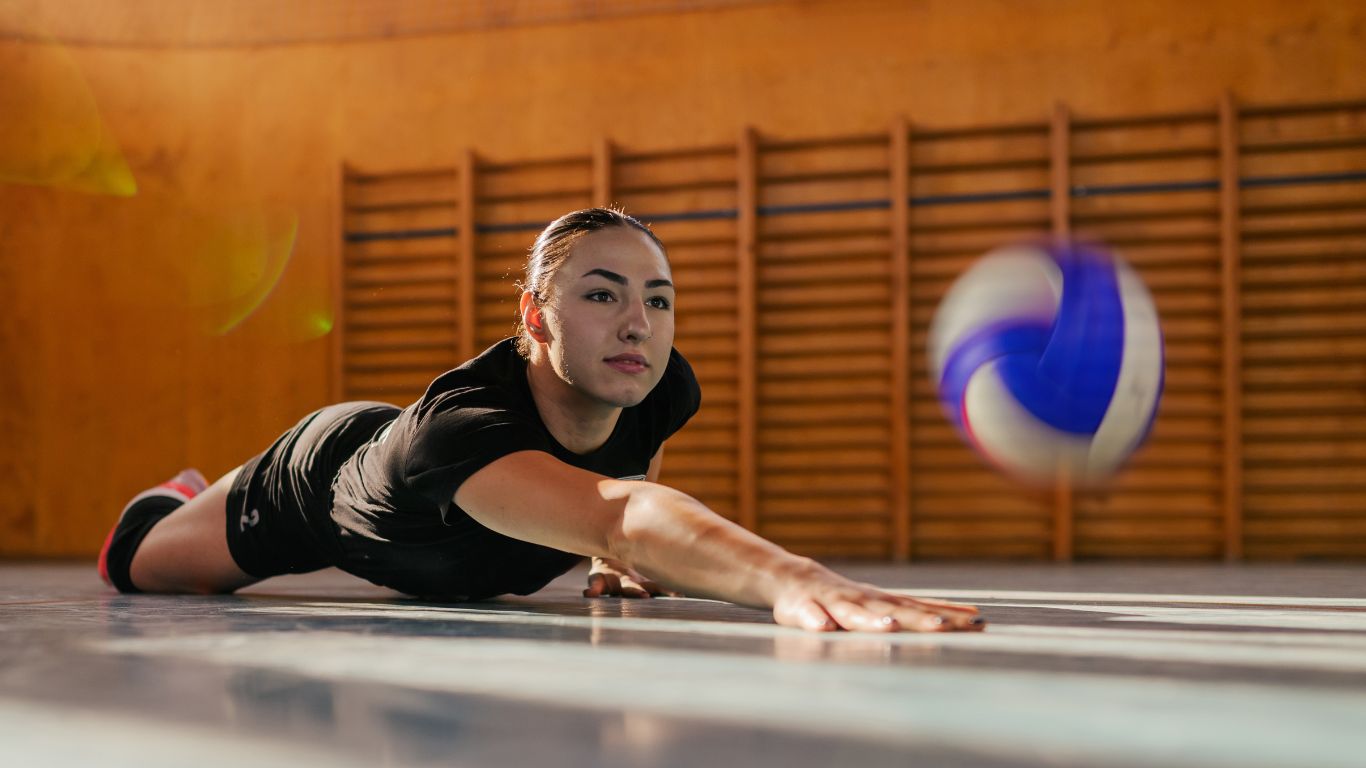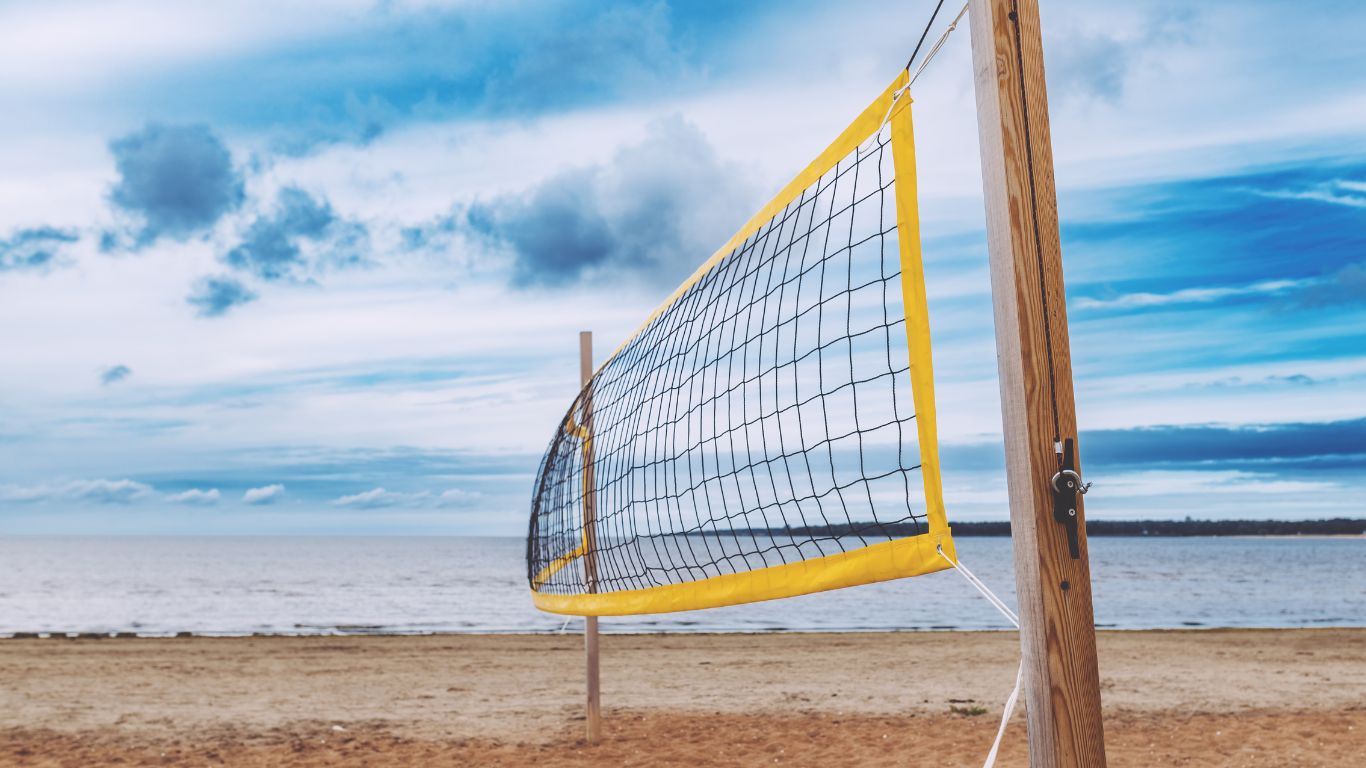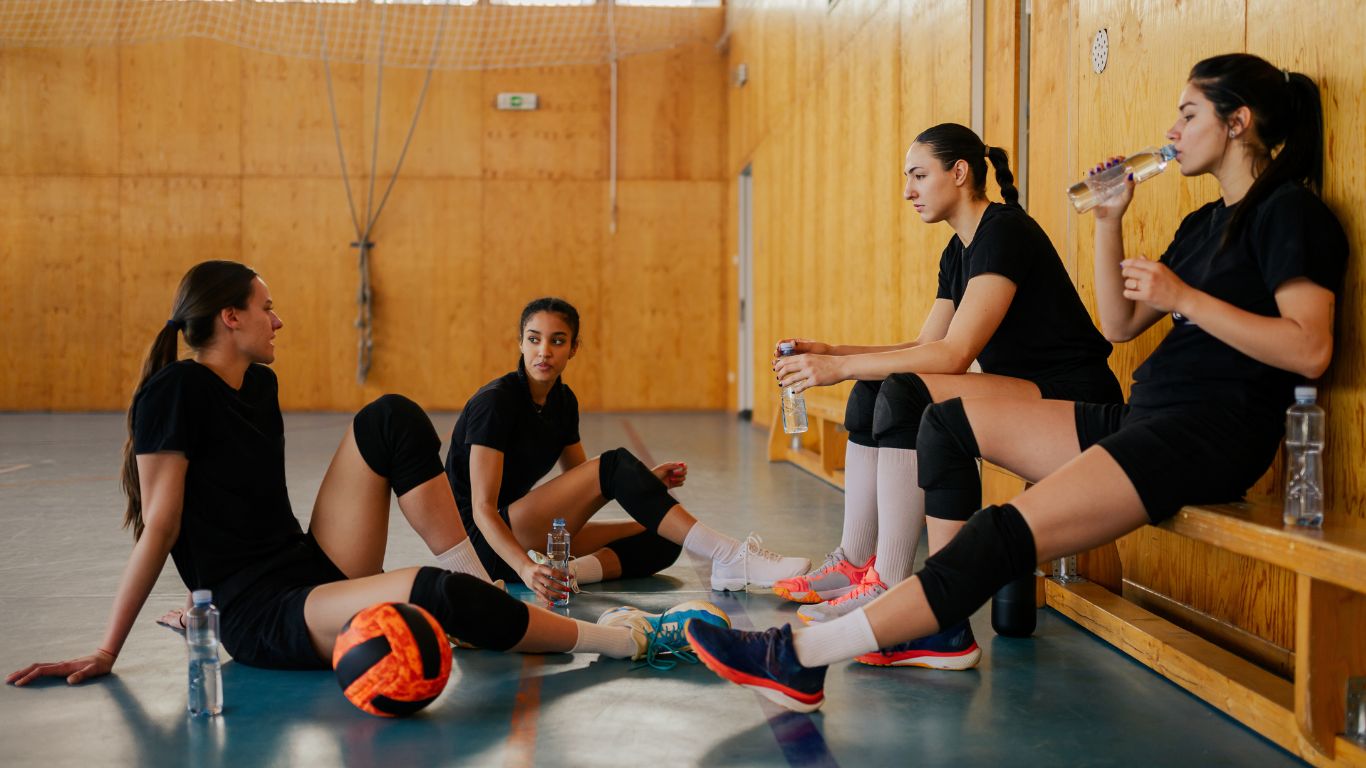A DS in volleyball refers to a “defensive specialist,” a player specialized in defensive maneuvers. In volleyball, a DS is responsible for receiving serves and providing strong defense, often replacing a front-row player.
Volleyball is a popular team sport that requires a variety of skills, including serving, setting, hitting, and blocking. One important position on the team is the defensive specialist, commonly known as a DS. As the name suggests, a DS is a player who specializes in defensive maneuvers and is primarily responsible for receiving serves and providing strong defense.
They often replace a front-row player and play primarily in the back row. The main goal of a DS is to receive the opponent’s serves successfully and to prevent the ball from hitting the ground on their side. This role requires excellent reflexes, agility, and a keen sense of anticipation to be able to make accurate passes and dig up hard-hit balls. A solid DS can greatly contribute to the team’s success by ensuring solid defense and allowing the team to set up successful attacks.

Credit: www.javelinsportsinc.com
Overview Of Volleyball Positions
HTML FORMATTED RESPONSE:
Volleyball is an exciting team sport that demands specific skills and coordination from its players. In order to effectively execute plays and secure victories, teams are divided into different positions, each with its own responsibilities on the court. Understanding the roles and responsibilities of each position is crucial for players to work together seamlessly. In this article, we will provide an overview of the different volleyball positions, including the libero, setter, middle blocker, outside hitter, and defensive specialist (DS).
Libero
The libero is a specialized defensive player who wears a different jersey color to differentiate themselves from the rest of the team. Their primary function is to excel in the defensive aspects of the game, providing exceptional passing, digging, and receiving skills. The libero often replaces the middle front position and cannot serve, attack, or block. They play a vital role in keeping the ball in play and setting up offensive plays for their team.
Setter
The setter is the playmaker on the volleyball court. They are responsible for setting up the offensive plays by accurately delivering the ball to their teammates for attacks. Good setters possess excellent hand-eye coordination and decision-making abilities. They need to quickly assess the situation and make split-second judgments to ensure that their team can mount effective attacks. The setter is often referred to as the quarterback or the brain of the team.
Middle Blocker
The middle blocker is positioned in the front and center of the net. Their primary role is to block the opponent’s attacks and disrupt their offensive strategies. Middle blockers are known for their height, agility, and quick reflexes, allowing them to successfully block or alter the trajectory of incoming attacks. In addition to their blocking skills, they also contribute as attacking options for their team, making timely jumps to execute powerful hits from the middle of the court.
Outside Hitter
The outside hitter, also known as the left-side hitter, plays a crucial role in both offense and defense. Positioned on the left side of the court, they have the freedom to attack from various angles. Outside hitters display a combination of skills, including powerful spikes, accurate passing, and solid defensive techniques. They often provide options for the setter, allowing for a more diverse offensive strategy. Outside hitters need to be versatile and adaptable to effectively counter different defensive strategies employed by the opposing team.
Defensive Specialist
The defensive specialist, commonly referred to as the DS or libero DS, is an expert in all defensive aspects of the game. Their primary objective is to prevent the ball from touching the ground on their side of the court. DS players are skilled in digging, receiving serves, and providing accurate passes to their teammates. They play a crucial role in supporting their team’s libero or backcourt players, ensuring that the ball remains in play and setting up effective attacks. DS players are adaptable and can often cover multiple positions effectively.

Credit: volleyballinsides.com
Role Of A Defensive Specialist
The Role of a Defensive Specialist in volleyball is crucial as they are responsible for maintaining a solid defense during a game. They play a key role in passing, defensive digging, coverage, and communication on the court. Let’s delve into each aspect in detail.
Passing
Passing is a fundamental skill in volleyball that involves receiving the ball from the opponent’s serve and directing it to the setter. As a Defensive Specialist, their primary task is to ensure accurate and consistent passing. They position themselves close to the sideline to cover a wide area and receive both short and deep serves. By using proper footwork and agility, they create a stable platform to effectively pass the ball to the setter.
Defensive Digging
Defensive digging is another vital aspect of a Defensive Specialist’s role. When the opposing team attacks, their objective is to dig the ball, preventing it from hitting the ground and allowing their team to continue the play. This requires quick reflexes, anticipation, and precise body positioning. As the ball approaches, the Defensive Specialist reacts swiftly, getting low to the ground in order to dig the ball up and keep it in play.
Coverage
Coverage is an important defensive strategy that involves players positioning themselves to protect open areas of the court. A Defensive Specialist plays a significant role in coverage by moving to areas where blockers may not be able to reach or where attackers frequently hit the ball. By maintaining good court awareness and quick reactions, they are able to cover these vulnerable spots and contribute to the team’s defensive efforts.
Communication
Effective communication plays a crucial role in the success of any volleyball team. As a Defensive Specialist, they take charge of communicating with their teammates, providing instructions, and guiding the defensive strategy. By communicating efficiently, they ensure that everyone is aware of their assigned defensive responsibilities and can react effectively during the game. Clear communication leads to better coordination and a stronger defensive unit.
In conclusion, the role of a Defensive Specialist in volleyball is multifaceted. From accurate passing and defensive digging to coverage and communication, they are an essential part of the team’s defensive strategy. By excelling in these areas, they contribute to the overall success of the team and help maintain a solid defense throughout the game.
Skills Required For A Defensive Specialist
As a defensive specialist in volleyball, certain skills are essential to excel in this position. The role of a defensive specialist is to efficiently cover the backcourt and pass the opponent’s attacks to initiate their team’s offense. This requires a unique set of skills that set defensive specialists apart from other players on the court.
Quick Reflexes
A defensive specialist needs to react swiftly to incoming balls, whether they are serves, spikes, or tips. Having quick reflexes allows them to anticipate the opponent’s moves and position themselves accordingly to make a play.
Reading The Opponent
Being able to analyze and read the opponent’s intentions is crucial for a defensive specialist. They must anticipate where the ball will be directed and adjust their positioning to effectively receive the attack. This keen awareness is a valuable asset on the court.
Body Control
Body control is essential for a defensive specialist to move swiftly and efficiently across the court. They should be able to change direction rapidly, dive, or make sudden stops while maintaining balance to reach the ball and make a play.
Accuracy
Precision and accuracy in passing are vital for a defensive specialist. They need to consistently deliver accurate passes to the setter or target location, enabling their team to execute offensive plays effectively.
Training And Development
Training and development in volleyball is essential to improve the skills and performance of defensive specialists (DS). With a specific focus on physical conditioning, technical drills, game situations, and video analysis, DS players can enhance their capabilities and contribute effectively to the team’s success.
Physical Conditioning
Effective physical conditioning is crucial for DS players to endure the demands of the game. Conditioning programs often concentrate on agility, speed, endurance, and strength training.
Technical Drills
Engaging in various technical drills can help DS players refine their passing, digging, and defensive techniques. This includes repetitive training on footwork, platform positioning, and body control.
Game Situations
A significant part of training and development involves simulating game situations during practice sessions. This allows DS players to adapt to different game scenarios and make split-second decisions.
Video Analysis
Video analysis plays a vital role in the development of DS players by providing a visual understanding of their performance. Analyzing game footage allows players to identify areas for improvement and learn from their mistakes.

Credit: msubsports.com
Frequently Asked Questions On What Is A Ds In Volleyball?
What Is The Difference Between Ds And Libero?
DS and libero are both playing positions in volleyball. However, the main difference is their defensive roles. A DS is a back-row player who can rotate to the front row and can also substitute for any position, while a libero is a specialized back-row player who cannot attack or block, but excels in digging and passing.
What Is Ds Stand For In Volleyball?
DS stands for “Defensive Specialist” in volleyball. It is a specialized position focused on defensive play and passing.
Why Is There A Defensive Specialist In Volleyball?
A defensive specialist is essential in volleyball to excel in defense and increase the team’s chances of winning by focusing on receiving and digging.
Can A Ds Play Front Row Volleyball?
Yes, a DS can play front row volleyball. The DS, or defensive specialist, is allowed to play in the front row as long as they do not perform an attack or block.
Conclusion
To sum up, a DS in volleyball stands for Defensive Specialist, a position that is crucial for a team’s success. They excel in passing and digging, enhancing the team’s overall defense. By understanding the importance of a DS in volleyball, players and coaches can optimize their strategies and make more informed decisions on the court.
So, next time you watch a volleyball match, keep an eye out for the skillful DS players making an impact.









